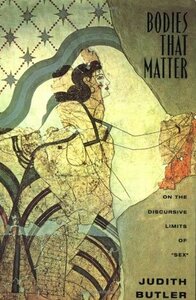Take a photo of a barcode or cover
challenging
informative
medium-paced
3 stars for being Important™️ but how I wish Judith could write in an accessible manner o.O
A very dense, but very interesting read for those who are interested in queer theory and feminist theory.
challenging
reflective
slow-paced
challenging
informative
reflective
medium-paced
butler knows many words, clear or consice are not ones. i was very excited to read this book only for it to be the most dense inaccessible book i’ve ever read, including hobbes. disappointing
This woman frustrates me greatly, for she thinks you can't pin her down, but she's so repetitive and obvious that even though this promises to provide the much needed clarifications to [b:Gender Trouble: Feminism and the Subversion of Identity|85767|Gender Trouble Feminism and the Subversion of Identity|Judith Butler|https://images.gr-assets.com/books/1349037224s/85767.jpg|2249813], it just reaffirms everything I knew that was wrong with that book. In her vision, not only gender is a construct, but sex too.
Of course she does not entirely reject the body, but says that there is nothing there which is not mediated by culture as if culture was bad on the whole. Of course, this is where the "BuT wHaT aBouT hErmApHrOdIteS?" argument comes from, failing to consider that even then, intersex people are a) extremely rare, and b)overwhelmingly genetically male. Sex is also determined by chromosomes rather than by a "phallogocentric Lacan dervided" construct. None of this takes away the reality of sex as such.
Annoyingly enough, she has no better idea than to go on about psychology for a lot of time in the book, never considering that she's making up *constructs* to defy the constructs she dislikes.

Science, folks.
Of course she does not entirely reject the body, but says that there is nothing there which is not mediated by culture as if culture was bad on the whole. Of course, this is where the "BuT wHaT aBouT hErmApHrOdIteS?" argument comes from, failing to consider that even then, intersex people are a) extremely rare, and b)overwhelmingly genetically male. Sex is also determined by chromosomes rather than by a "phallogocentric Lacan dervided" construct. None of this takes away the reality of sex as such.
Annoyingly enough, she has no better idea than to go on about psychology for a lot of time in the book, never considering that she's making up *constructs* to defy the constructs she dislikes.

Science, folks.
Wow. This was so fascinating.
This is very much a response to Butler’s earlier (and more well known) work ‘Gender Trouble’, and despite having read it a couple of years ago I think the two do work together very well. Here, Butler takes the body itself as her place of departure, exploring the ways in which discourse acts to constitute the body, and the power that constructs this discourse. I thought her use of Derridean citationality with reference to gender performativity and how it ultimately reveals the unstable and incoherent nature of gender itself was particularly fascinating, and her argument for a fundamentally intersectional queer theory with her analysis of Nella Larsen’s ‘Passing’ is brilliant. This is as dense as Butler always is, but absolutely worth the work.
This is very much a response to Butler’s earlier (and more well known) work ‘Gender Trouble’, and despite having read it a couple of years ago I think the two do work together very well. Here, Butler takes the body itself as her place of departure, exploring the ways in which discourse acts to constitute the body, and the power that constructs this discourse. I thought her use of Derridean citationality with reference to gender performativity and how it ultimately reveals the unstable and incoherent nature of gender itself was particularly fascinating, and her argument for a fundamentally intersectional queer theory with her analysis of Nella Larsen’s ‘Passing’ is brilliant. This is as dense as Butler always is, but absolutely worth the work.
slow-paced
In Gender Trouble, Judith Butler argued that gender is constructed through the performative. A common critique offered to that work was that Butler was consigning the body to the realm of the linguistic and not retaining materiality. In Bodies that Matter, Butler answers that criticism, arguing for “a return to the notion of matter, not as site or surface, but as a process of materialization that stabilizes over time to produce the effect of boundary, fixity, and surface we call matter.” (xviii) Bodies, while linguistically constructed and inscribed with notions of gender, are areas of boundary and fixity. The performative is a ritual, it is a set of practices continually enacted through which identity is formed. Butler says, “Generally speaking, a performative functions to produce that which it declares. As a discursive practice (performative ‘acts’ must be repeated to become efficacious), performatives constitute a locus of discursive production. No ‘act’ apart from a regularized and sanctioned practice can wield the power to produce that which it declares. Indeed, performative act apart from a reiterated and, hence, sanctioned set of conventions can appear only as a vain effort to produce effects that it cannot possibly produce.” (70) For Butler, there is no prediscursive subject. Our identity and subjectivity comes precisely through the linguistic construction and complex interplay of power we experience in the world.
Overall, I found this difficult book to be ultimately helpful in clarifying some of Butler's positions in Gender Trouble. I find her notion of the performative as ritual to be helpful in naming the processes by which identity is formed. I also found her interaction with Foucault's Discipline and Punish to be illuminating and helpful as well. This is a tough read, but well worth the effort.
Overall, I found this difficult book to be ultimately helpful in clarifying some of Butler's positions in Gender Trouble. I find her notion of the performative as ritual to be helpful in naming the processes by which identity is formed. I also found her interaction with Foucault's Discipline and Punish to be illuminating and helpful as well. This is a tough read, but well worth the effort.







